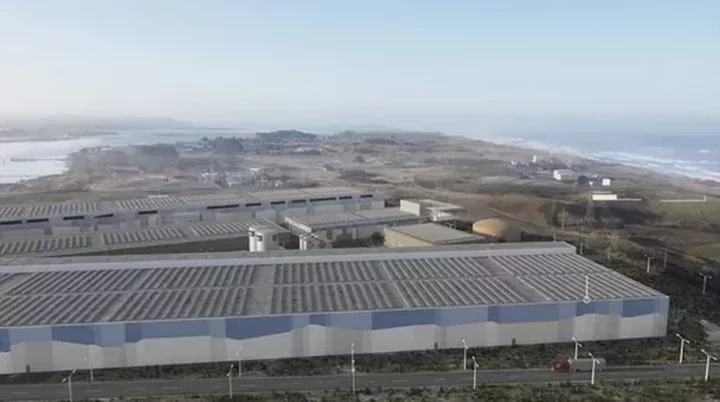Architectural mock-up of the land-based fish farm Nordic Aquafarms plans for the Samoa Peninsula.
###
Last week the California Coastal Commission unanimously denied five separate appeals challenging permit approvals for Nordic Aquafarms’ big onshore recirculating aquaculture system (RAS) planned for the Samoa Peninsula.
Appellants, including the Redwood Region Audubon Society, Salmonid Restoration Federation, 350 Humboldt, and local residents Alison Willy and Scott Frazer, argued that the permitting agencies didn’t adequately account for a variety of potential environmental impacts to the climate, marine resources, dune habitat and public access.
But Coastal Commission staff pointed to the fact that the onshore fish farm, now slated to produce thousands of metric tons of yellowtail per year for distribution up and down the West Coast, will be constructed on a designated brownfield. The property formerly housed the Samoa Pulp Mill, which left behind millions of gallons of toxic pulping liquors.
At last week’s meeting, Melissa Kraemer, coastal program manager for the Coastal Commission’s North Coast District, said, “While the approved development is a relatively large project, its footprint and scope are limited to brownfield lands and redevelopment of areas that historically were developed with industrial uses. Given the high degree of factual and legal support for the county’s decision, and its required conditions of approval, staff believes that the consideration of the five factors together support a conclusion that no substantial issue is raised.”
The commission agreed, much to the delight of Nordic Aquafarms, which today issued the following press release:
Last week, the California Coastal Commission voted unanimously in alignment with the staff recommendation finding “no substantial issue” raised in the five appeals, upholding the County approval for Nordic Aquafarms’ terrestrial Coastal Development Permit (CDP). This step of checks and balances acknowledged the concerns raised in the appeals and indicated that the scope of those concerns fell outside the realm of the coastal development permit.
The California Coastal Commission, known for its rigorous evaluation process, thoroughly examined Nordic Aquafarms’ proposal and the issues raised in the appeals over the last year, and found it in alignment with the Local Coastal Plan, the Coastal Act, and environmentally sustainable goals. The “no substantial issue” recommendation not only recognizes the scope of the appeals as they relate to CDP, but also reflects the project’s adherence to stringent environmental regulations.
Nordic Aquafarms’ innovative approach to sustainable seafood production embraces cutting-edge technology and leading environmental practices. Overall, the approved terrestrial Coastal Development Permit is a significant stride towards creating a model for sustainable aquaculture that meets the growing demand for seafood without compromising the delicate coastal environment.
“We are glad for the California Coastal Commission’s unanimous decision, and the support of the community for Nordic Aquafarms,” said Brenda Chandler, US CEO of Nordic Aquafarms. “This approval not only underscores our commitment to environmental stewardship, but also highlights California’s role as a leader in addressing challenges related to sustainable food production.”
The CDP approval helps to solidify Nordic Aquafarms as a key player in the emerging landscape of onshore sustainable aquaculture. By embracing forward-thinking initiatives, and environmentally friendly practices, Nordic Aquafarms is contributing to the broader solution for responsible seafood production, aligning with California’s dedication to the highest environmental standards and finding solutions to global issues.
###
PREVIOUSLY:
- Massive New Fish Farm in the Works for Samoa Peninsula; Harbor District Expected to Bless Project Helmed by Norwegian Firm at Special Meeting Monday
- Humboldt Baykeeper Says: Samoa Fish Farm Proposal Looks Good So Far, But the Devil Will Be in the Details
- Let’s Take a Closer Look at This Big Fish Farm Proposal for the Samoa Peninsula
- In a Surprise Move, Nordic Aquafarms Agrees to Conduct Full Environmental Impact Report for Its Land-Based Fish Farm on the Samoa Peninsula
- Planning Commission Set to Consider Permits for Nordic Aquafarms Project Tonight
- Fishermen and Conservation Groups Appeal Nordic Aquafarms’ Environmental Report Certification to Humboldt County Supervisors
- Nordic Aquafarms Celebrates ‘Monumental Step Forward’ After Supes Deny Project Appeal
- Salmon OUT, Yellowtail IN: Nordic Aquafarms Announces Species Switch-Up at its Planned Humboldt Facility
- Water Quality Board Awards Wastewater Discharge Permit for Nordic Aquafarms’ Planned Peninsula Facility
- Coastal Commission OKs Water Discharge Permit for Nordic Aquafarms’ Onshore Fish Farm

CLICK TO MANAGE